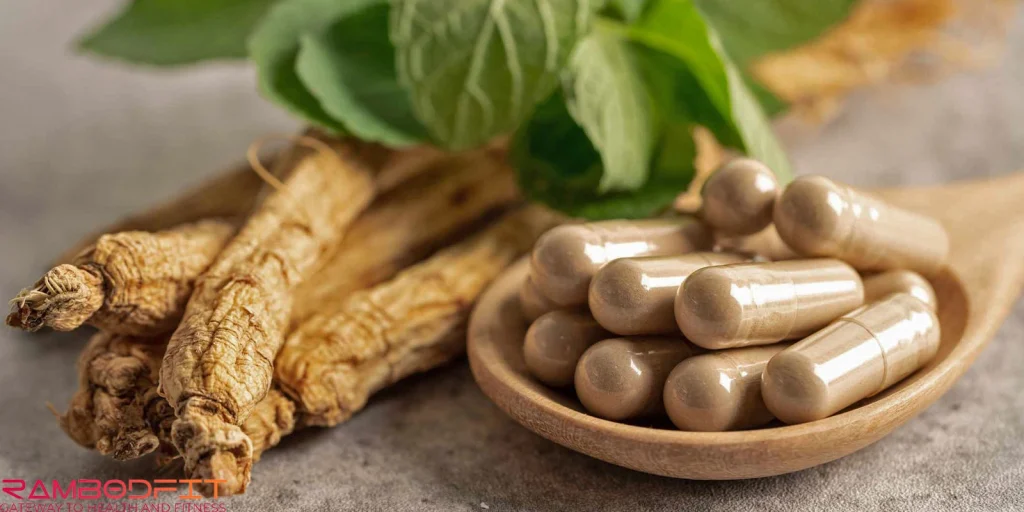


I’ll never forget the first time I got handed that little bottle of ginseng. Ginseng for metabolism and stress wasn’t even on my radar—I thought it was just some wellness buzzword.
Picture this—I’m three years deep into lifting, grinding away at the gym, but suddenly, nothing’s clicking. My lifts? Stuck. My brain? Toast. I’m chugging coffee like it’s holy water, but by 3 p.m., I’m basically a zombie staring at spreadsheets. Then my coach, this dude who never says much, just lobs me this bottle and goes, “Try ginseng.
Not a miracle, but it might actually do something.” Straight up, I thought it was just some ancient tea thing, or one of those ingredients they slap on energy drink cans to make you feel fancy.
Honestly, I had no clue why people were so hyped about it. Ginseng sounded like the kind of stuff your grandma would brew when you’re sick, or maybe some “wellness influencer” would sprinkle into a smoothie. Turns out, I was way off. This stuff isn’t just about helping your body “deal with stress” (though, yeah, it’s got that adaptogen label).
It’s wild how much it can do—think hormones, blood flow, metabolism, even helping your brain fire on all cylinders and keeping your immune system from totally tanking. Ginseng for metabolism and stress became something I didn’t just take—I started relying on it.
Here’s Rambodfit: I’m gonna break down everything I wish someone told me sooner about ginseng for metabolism and stress. No fluffy nonsense, just the real science, my own mess-ups, and some tricks I picked up along the way. By the end, you’ll actually get how ginseng works, why it deserves more hype than it gets, and whether you should bother adding it to your supplement shelf—or just leave it to the energy drink crowd.
Spoiler: Ginseng for metabolism and stress might be one of the most underrated tools in your recovery and performance stack.
Table of Contents

Ginseng for metabolism and stress has been kicking around forever—seriously, this stuff is ancient. We’re talking about Panax ginseng, the OG superstar in East Asian medicine cabinets. Korea, China, Japan… They’ve been obsessed for centuries. By the way, “Panax” is just an old Greek term that means “cure-all.” Healers really thought this root could fix pretty much anything. Honestly, who can blame ‘em?
Back in the day, people would either chew on the roots like it was nature’s energy gum or brew them up in teas, swearing it gave them a brain boost, more stamina, and, yeah, apparently spiced things up in the bedroom too. Ginseng for metabolism and stress wasn’t just folklore—it was daily fuel. Fast forward to now: You’ll spot ginseng everywhere. Pills, powders, those “healthy” energy bars, even fancy face creams.
But here’s the thing—not just another hyped-up wellness fad. Ginseng’s got actual research receipts, especially thanks to these wild little chemicals called ginsenosides. Science is kind of obsessed with them, for good reason.
Ginseng for metabolism and stress owes a lot of its power to ginsenosides. Basically, they’re the secret sauce in ginseng. The real MVPs. Picture them as the heavy lifters, running around your body doing all sorts of odd jobs—tweaking your energy, giving your brain a pep talk, and even looking after your blood vessels. Wild, right? And get this, there’s like 30-plus types of these little guys, each one with its own vibe.
Honestly, when I first stumbled across all this ginsenoside hype, I had my doubts. I mean, c’mon—one plant, this many benefits? Sounds like snake oil. But, turns out, the magic is in how they multitask. Instead of just blasting one system like caffeine does (hello, jitter city), ginsenosides juggle a bunch of different pathways at once. That’s why ginseng gives you that smooth, steady lift instead of the classic crash-and-burn. Pretty cool for an old root, huh?
Ginseng’s magic isn’t random. Here’s a deep dive into the mechanisms backed by both traditional wisdom and modern science.
Okay, so—yeah, all this HPA axis talk sounds like mad scientist territory, but it’s just your body’s stress HQ, honestly. That’s where cortisol, the “I’m freaking out” hormone, gets managed. And let me tell you, if that stuff stays high for too long, say goodbye to good sleep, steady energy, and, oh yeah, fat loss? Forget it. That’s exactly where Ginseng for metabolism and stress starts pulling its weight.
Now, ginseng’s a bit of a legend here. It’s in the adaptogen family—ashwagandha fans, you get it. Basically, it doesn’t just slam the brakes on cortisol. It’s more like a thermostat for your stress. If you’re buzzing with anxiety, it chills you out. If you’re a zombie from burnout, it nudges you awake. And the metabolic side? Real talk—Ginseng for metabolism and stress might be the quiet MVP behind that steady energy you’ve been chasing.
I’m not just parroting studies, either. Swear, after a couple of weeks on ginseng, life’s little annoyances? Didn’t bug me as much. Traffic jams? Meh. Post-gym exhaustion? I bounced back way quicker. And yeah, there’s legit science to back it up—researchers have seen ginseng help people handle stress better and feel less wiped out, all thanks to its magic with the HPA axis (PMC8020288).
Let’s get into what makes ginseng such a hot topic: nitric oxide. Yeah, that’s right—NO. Not just a gas NASA cares about; your body actually cranks this stuff out to chill your blood vessels, which basically means your circulation gets a major upgrade. Ginseng for metabolism and stress isn’t just about feeling calm—it’s also doing some serious work behind the scenes with blood flow and recovery.
So, why should you even care? Two big reasons, honestly:
I’ll be real—I thought ginseng was just an energy thing, like some herbal Red Bull situation. But, wild plot twist, my muscle pumps actually got juicier, and I bounced back faster after a workout. And yep, Ginseng for metabolism and stress plays a role here too—science backs it up: those little things in ginseng called ginsenosides? They get your body to pump out more NO in your blood vessels, which is awesome for your heart and, well, everywhere else. (PubMed 35873557)
Ever get that feeling where your brain’s just running on fumes after a week from hell? Yeah, same. Ginseng for metabolism and stress is kinda like jumper cables for your mind. Supposedly, it’s packed with antioxidants that shield your brain cells from all the junk that makes you foggy and forgetful. Basically, it’s fighting off mental burnout.
And there’s more—ginseng’s out here hyping up your dopamine and serotonin, those “feel-good” brain chemicals. Maybe that’s why some folks end up in a weirdly good mood or suddenly find the energy to get stuff done, no joke.
Honestly, I noticed I could hammer out words way easier (like right now—shoutout to ginseng) and wasn’t falling into that endless scroll of doom. It’s not some magical brain upgrade, but hey, I’ll take any edge I can get.
Ever hit the gym hard, felt like a superhero, and then—bam—you’re sniffling on the couch with a box of tissues? Too much heavy training can totally mess with your immune system for a bit. Ginseng for metabolism and stress steps in like some ancient herbal bouncer, waking up your natural killer cells and macrophages (basically your body’s own tiny security squad). And the bonus? It’s not just immunity—it’s also helping you recover smoothly by keeping stress hormones in check.
Honestly, I remember this one winter I was grinding through half-marathon training, freezing my butt off every morning, and somehow managed not to get sick at all. Wild, right? Turns out, it wasn’t just luck—science backs it up. Ginseng for metabolism and stress tweaks your immune system in all the right ways, boosting both your first line of defense and your longer-term immunity. Pretty clutch if you ask me.
So, here’s the thing—stimulants? Yeah, they’re basically robbing your future self to hype you up right now (caffeine junkies, I’m side-eyeing you). Ginseng for metabolism and stress has a different vibe. It actually helps your cells get their act together—pulling in more glucose, making those mitochondria hustle harder. Basically, it teaches your body to squeeze out more juice from whatever you eat.
That’s why athletes are all about it: no wild spikes, no embarrassing crashes. Personally, I noticed I could stick around the gym way longer—didn’t even have to panic-chug a sad, watery espresso halfway through.

Alright, so what’s the takeaway here? Basically, if you’re hitting the gym, grinding through endless Zoom calls, or just trying to stay awake during life, Ginseng for metabolism and stress has got your back:
Honestly, it’s like a cheat code for functioning humans.
Alright, here’s the real talk on ginseng: most folks out there are popping anywhere from 600 up to 1000 mg a day of the standardized stuff. If you’re just starting out, don’t go full send—ease in at the lower end, see how your body vibes with it, and then tweak if you need more juice. Ginseng for metabolism and stress is powerful, so it pays to start slow and smart.
Couple quick pro tips:
Side effects? Not super common, but hey, everyone’s a little weird. You might get insomnia, feel weirdly jittery, or your stomach could stage a minor protest if you overdo it. Oh, and if you’re on meds—especially blood thinners—talk to your doc first. Seriously, don’t mess around.
Ashwagandha, rhodiola, maca—those are everywhere, right? It’s like you can’t walk into a health food store without tripping over a tub of something claiming to “balance your vibes.” But Ginseng for metabolism and stress? That one’s in a league of its own. It’s not just another stress-buster or mood-booster. Ginseng’s basically the multitool of the adaptogen world. You feel sluggish? Ginseng’s supposed to kick your energy up a notch. Brain fog? People swear by it for focus and memory. Feeling tense? It’s got your back with stress relief, too. And it doesn’t stop there—it actually helps with blood circulation, which is kinda wild when you think about how many supplements focus on just one thing.
Honestly, if adaptogens were superheroes, ashwagandha might be that chill, laid-back guy who handles stress and hormone stuff, while ginseng’s out here doing the work of a whole team. The catch? You’ll probably pay more for it. Good ginseng isn’t cheap, and if you see a bargain-bin option, it’s probably not the real deal.
Some folks even treat top-quality ginseng roots like collectibles—seriously, there are people who geek out over the age and shape of these roots like they’re rare Pokémon cards or something.
So yeah, if you’re looking for something with a broad reach—energy, brain, stress, circulation—Ginseng for metabolism and stress is the heavy hitter. Just be ready to shell out a bit more cash for the good stuff.

Let’s dig a little deeper. Ginseng for metabolism and stress isn’t just that ancient root people throw into teas and health shots for kicks—it’s been around forever, and folks swear by it for all sorts of reasons. You know how lots of energy drinks basically slap you awake and then leave you for dead a few hours later? Ginseng’s the opposite. It’s like your wise old grandma who tells you to pace yourself instead of sprinting through life and crashing face-first into the couch by 3 p.m.
I’ll be real—I used to chase that “buzz” from coffee or weird energy gummies, but it always ended the same: jittery, brain fog, regretting my life choices. When I switched to ginseng, the shift was wild. My energy wasn’t just ON or OFF, it was more like a dimmer switch. I could focus longer, didn’t snap at people for no reason, and workouts didn’t wreck me for two days straight. Oh, and my stress? Not gone, but definitely less of a raging dumpster fire—thanks to Ginseng for metabolism and stress, keeping things balanced.
There’s also this thing about circulation. Some people claim they notice warmer hands and feet, or just a general feeling that their body’s not running on fumes anymore. Science is still catching up on exactly how ginseng does all this, but, hey, people have been using it for centuries—maybe they were onto something.
Bottom line? If you want a quick fix, just pound a double espresso and call it a day. But if you’re actually looking for something that helps you not just survive but maybe even thrive a little—mentally, physically, all of it—ginseng’s worth a shot. Worst case, you find out you hate the taste. Best case, you get a new secret weapon for this wild ride called life.
Honestly? Don’t expect fireworks on day one. Usually, it’s more like—huh, I guess I’m not crashing at 3 pm anymore—after a week or two. The real magic—think immune boost, better blood flow, and Ginseng for metabolism and stress benefits—takes a bit longer. Give it four to six weeks if you want the full package. Patience, grasshopper.
Yeah, you can. Actually, ginseng and caffeine together can feel pretty awesome—like, focused energy that doesn’t make you want to crawl out of your skin. Just, uh, don’t chug both at night unless you’re planning to stare at your ceiling counting sheep ‘til sunrise. Oh, and check your pre-workout label—some sneak ginseng in already. No need to double-dip.
For most folks, yep. Stick to sane amounts (like 600–1000 mg) and you’re golden. People have been downing this stuff for ages. Still, it’s not a bad idea to take a break now and then—keeps your body from getting lazy and upping your “dosage just to feel something, man.” Cycle it. Your future self will thank you for keeping up with Ginseng for metabolism and stress.